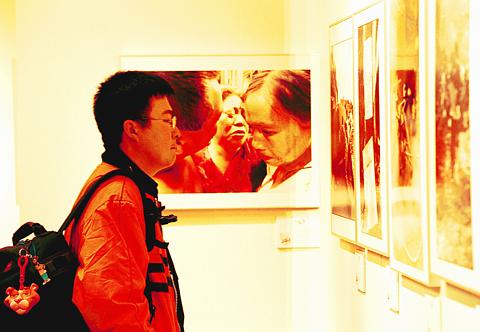As many are beginning to forget the disastrous earthquake which struck Taiwan on Sept. 21, 1999, a group of photographers and photojournalists have decided to prick the public's memory of the tragedy by publishing their photo collections of the quake.
"Photographers used their cameras to record a complete story of the quake. What we want to do here is to show that people are still suffering and that there are still people who need help," said event co-organizer Suan Hooi-wah (?thorn>會華).
David Smith, a professional photojournalist from Canada, contributed 45 pictures, of which 15 have been included in the exhibition.

PHOTO: CHIANG YING-YING, TAIPEI TIMES
"As a foreigner, I tend to see things somewhat differently than the local people. What strikes me most is that I see how Taiwanese people have joined together to deal with the disaster," he said.
Crystal Chiang (
"When you see so many people lose their families and the dead bodies lying on the ground, you feel sorry for them but you simply cannot do anything about it," she said.
The photo exhibition, titled "The quake -- a frame-by-frame record of Taiwan's Sept. 21, 1999 earthquake," will run from Jan. 8 through Jan. 23 in the basement of the Eslite Bookstore on Tunhua South Road.
Also available at the exhibition is a photo collection which contains 240 pages of black-and-white pictures. The photo book is a collection of some 400 pictures contributed by 200 local photographers and photojournalists which were chosen by a panel of judges. Accompanying the pictures are 10 Chinese and English articles contributed by writers and journalists.
The retail price of the book is NT$2,000. Proceeds will go to a Cabinet committee to be used for the education of Aboriginal children in disaster areas.
There are only 3,000 copies available, of which 1,000 have already been ordered by individuals and 75 more by the event co-organizer, the Government Information Office, Suan said.

A Chinese aircraft carrier group entered Japan’s economic waters over the weekend, before exiting to conduct drills involving fighter jets, the Japanese Ministry of Defense said yesterday. The Liaoning aircraft carrier, two missile destroyers and one fast combat supply ship sailed about 300km southwest of Japan’s easternmost island of Minamitori on Saturday, a ministry statement said. It was the first time a Chinese aircraft carrier had entered that part of Japan’s exclusive economic zone (EEZ), a ministry spokesman said. “We think the Chinese military is trying to improve its operational capability and ability to conduct operations in distant areas,” the spokesman said. China’s growing

Taiwan yesterday denied Chinese allegations that its military was behind a cyberattack on a technology company in Guangzhou, after city authorities issued warrants for 20 suspects. The Guangzhou Municipal Public Security Bureau earlier yesterday issued warrants for 20 people it identified as members of the Information, Communications and Electronic Force Command (ICEFCOM). The bureau alleged they were behind a May 20 cyberattack targeting the backend system of a self-service facility at the company. “ICEFCOM, under Taiwan’s ruling Democratic Progressive Party, directed the illegal attack,” the warrant says. The bureau placed a bounty of 10,000 yuan (US$1,392) on each of the 20 people named in

Nine retired generals from Taiwan, Japan and the US have been invited to participate in a tabletop exercise hosted by the Taipei School of Economics and Political Science Foundation tomorrow and Wednesday that simulates a potential Chinese invasion of Taiwan in 2030, the foundation said yesterday. The five retired Taiwanese generals would include retired admiral Lee Hsi-min (李喜明), joined by retired US Navy admiral Michael Mullen and former chief of staff of the Japan Self-Defense Forces general Shigeru Iwasaki, it said. The simulation aims to offer strategic insights into regional security and peace in the Taiwan Strait, it added. Foundation chair Huang Huang-hsiung

PUBLIC WARNING: The two students had been tricked into going to Hong Kong for a ‘high-paying’ job, which sent them to a scam center in Cambodia Police warned the public not to trust job advertisements touting high pay abroad following the return of two college students over the weekend who had been trafficked and forced to work at a cyberscam center in Cambodia. The two victims, surnamed Lee (李), 18, and Lin (林), 19, were interviewed by police after landing in Taiwan on Saturday. Taichung’s Chingshui Police Precinct said in a statement yesterday that the two students are good friends, and Lin had suspended her studies after seeing the ad promising good pay to work in Hong Kong. Lee’s grandfather on Thursday reported to police that Lee had sent